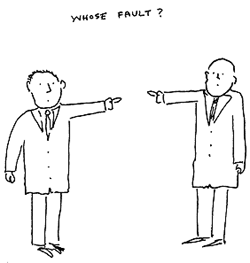Whose fault is it if you're not successful?
Veterinary medicine is not always all you hoped it would be. So, who's to blame? It's the veterinary teaching hospitals' fault. They are the gatekeepers of the profession. Blame them. No, it's the state legislatures. If they only supplied more money to the teaching hospitals, it would improve education. No, it's the federal government's fault. Or maybe we can put it all down to inflation.
Dr. James Kramer of the Columbus Animal Hospital in Columbus, Neb, suggested the problem lies elsewhere. In his talk at the AVMA Annual Convention in Salt Lake City, "Veterinary Attitudes, Aptitudes, and Income" (part of the Advances in Veterinary Medicine program), he asked attendees to indicate what they thought were the biggest problems facing the veterinary profession. The answers were familiar: income level not high enough, clients not willing to pay for quality services, student debt load, saturation of practices, the public perception of veterinarians.
He challenged, however, the idea that veterinarians' level of success is dependent on circumstances beyond their control. "We are not a castle on a hill being assailed by outside forces," he said.
In his estimation, the problem boils down to one main thing, and that is veterinarians' perception of themselves.
 Dr. Kramer, who in addition to being a practitioner is immediate past president of the Nebraska VMA, acknowledged that some forces that drive change are beyond control (he cited population, demographics, increased knowledge, and technologic advances, for example).
Dr. Kramer, who in addition to being a practitioner is immediate past president of the Nebraska VMA, acknowledged that some forces that drive change are beyond control (he cited population, demographics, increased knowledge, and technologic advances, for example).
"Some futurists say that in 10 years, 80 percent of the American work force will be working in jobs that don't exist today, making products and services that don't exist today, and for companies that don't exist today."
Dr. Kramer believes, however, that the practitioner who is willing to be flexible can address many of the challenges the future holds.
He also believes that veterinarians tend to undervalue themselves. "We've neglected the opportunity to increase demand for our service." Who sets the fees? We do."
He asserted that, although veterinarians place fees as a number one concern, clients tend to look at price as a lesser concern, favoring other attributes such as compassion, reliability, and cleanliness. He believes that the perception of caring is paramount. "Our ability to be compassionate and build relationships with clients — no one can take our business away from us if we have that."
"When we have pride in ourselves," Dr. Kramer added, "our financial problems will take care of themselves."